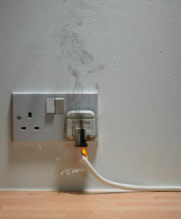

Why is portable appliance testing required?
An employer has the responsibility of
taking adequate steps to ensure that users of the appliances are protected from both
electrical shock and fire hazards. They also have to meet the requirements of the
1989 Electricity at Work act. To meet this it is widely regarded to be necessary
to implement a regular program of inspecting and testing of portable appliances.
The Corporate Manslaughter and Corporate Homicide Act 2007 is a landmark in law. For the first time, companies and organisations can be found guilty of corporate manslaughter as a result of serious management failures resulting in a gross breach of a duty of care.
The Act, which came into force on 6 April 2008, clarifies the criminal liabilities of companies including large organisations where serious failures in the management of health and safety result in a fatality.
I run a small business, do I need to have my portable appliances tested?
The Electricity
at Work Regulations apply to all businesses from multi-nationals to sole traders.
So you still need to comply, an increasing number of sites are turning contractors
away if tools do not have the required PAT documentation.
Who is responsible for portable appliance safety?
All businesses from a small firm
(Including the self-employed) to much larger organisations have a responsibility
for the safe use and maintenance of their electrical appliances. As well as the responsibility
for their own appliances they are also responsible for appliances brought onto site
by employees and contractors.
Landlords are responsible for any equipment/appliances
that they provide.
Is electrical testing a requirement of my insurance company?
Quite a large number
of insurers insist that portable appliance testing be carried out on a regular basis,
and more are starting to join with this idea. If you suffer an avoidable accident,
then under law if found guilty you will be deemed to of committed a criminal offence.
Insurers will not pay fines or compensation resulting from a criminal offence.
Why have I not needed to have testing carried out before?
There has always been a
requirement to satisfy Health & Safety legislation. In 1989 The Electricity at work
Regulations came into force, which clarifies the need to maintain electrical systems
safely. So there has always been a need and test data results will form a major part
of your defence should an accident occur which leads to prosecution.
What will happen if we don't have testing carried out?
Unless and until you suffer
an accident then most probably nothing will happen. However, you should remember
that maintenance of a electrical system or equipment is a legal requirement. therefore
a preventable accident could lead to prosecution, for which there will be no insurance
cover.
How often should portable appliances be tested?
The results of previous tests should
be considered in a programme of risk assessments. In the absence of such history
then the following intervals could be considered as a guide. But remember that other
factors such as the ability of site staff to identify potential damage or faults
and take suitable action. Mechanical damage and abuse must also be taken into consideration.
Low-risk
24-Monthly or more
Medium risk 12-Monthly
High risk (i.e. workshop equipment) 6-monthly
Very
high risk (i.e. site equipment) 3-monthly
How will I know when my next test is due?
All appliances, once tested are clearly
labelled with the “Test Due” date, I also hold records of all clients, together with
re-test dates on my database and remind clients when re-tests are due.
Where can I obtain more information
HSE & Electrical Safety Council Have a wide range of downloadable & FREE leaflets in PDF format, the following will be of interest regarding electricity..........
1) Electrical Safety & You
2) Maintaining portable electrical equipment in Hotels & Tourist accommodation
3) Maintaining portable electrical equipment in offices & other low risk environments
The bottom line is, we all know that Health & Safety is everyone's responsibility & there is no excuse that is acceptable regarding ignorance of the law.






